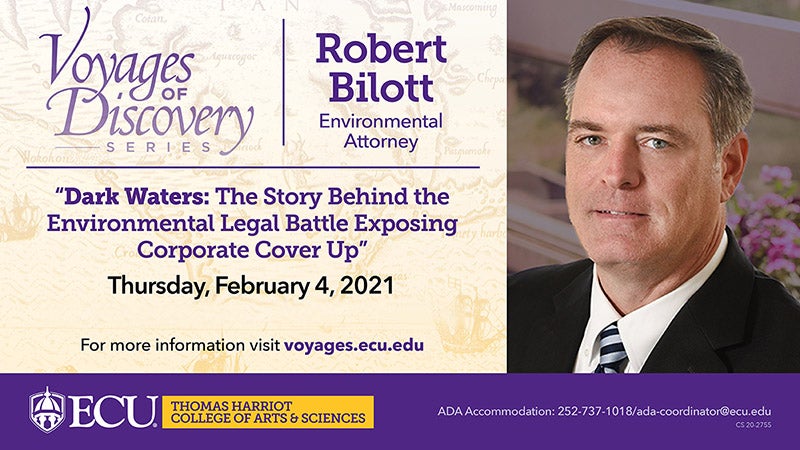Get educated about PFAS!
Learn about GenX, PFOA, and other PFAS "forever chemicals" that impact the health of our communities and environment in ENC with Dr. DeWitt and Dark Waters lawyer Robert Bilott.
A perspective on PFAS in eastern North Carolina
By Dr. Jamie DeWitt, Associate Professor of Pharmacology & Toxicology, ECU
“Toxin taints CFPUA drinking water” was a headline in the Wilmington StarNews on June 7, 2017. The contaminant highlighted in the article goes by the somewhat sexy trade name “GenX.” It had been floating down the Cape Fear River for decades but its presence in drinking water didn’t receive much notice from the public until StarNews Correspondent Vaughn Hagerty had his piece published. GenX, otherwise known as “hexafluoropropylene oxide-dimer acid,” was just one of many per- and polyfluoroalkyl substances (PFAS) tainting the drinking water provided to residents in and around the Wilmington area.
PFAS (“pee-fass”) are synthetic organic substances that contain fluorine and they are used in a variety of products and processes. They are prized for their stability and ability to provide stain, water, and oil repellant properties to surfaces. Their stability, or persistence, however, is also their problem. They don’t easily get broken down by microbes or sunlight or the enzymes in our bodies. They last and last, which is why some have termed them “forever chemicals.” There’s also lots of them – nearly 10,000 individual substances and counting. Scientists have studied only a handful but they have been associated with negative health outcomes – kidney and testicular cancer, liver disease, high cholesterol, thyroid disease, autoimmune disease, developmental toxicity, and immune suppression. PFAS aren’t just limited to the Wilmington area of eastern North Carolina; they’ve been detected nearly everywhere scientists have looked. They get released into the environment through many different pathways (chemical manufacturing, fire-training/fire-extinguishing with PFAS-containing foams, land application of biosolids that contain PFAS, and more).
What can people do about their exposure to PFAS?
- First, find out if PFAS is in the water that you drink. You can look up results for your water utility through testing done by the PFAS Testing Network (https://ncpfastnetwork.com/data-and-tools/). If you’re on a private well, you’ll likely have to pay for your own testing. This can be expensive but some commercial labs are available and the Washtenaw County Health Department in Michigan has a nice page of links available (https://www.washtenaw.org/2849/How-to-Test-Drinking-Water-for-PFAS).
- Second, consider using a water filter if you do have PFAS in your drinking water. A group of professors from universities here in North Carolina published findings on how well the kind of “point of use” filters you would use in your home work for removing PFAS (https://pubs.acs.org/doi/10.1021/acs.estlett.0c00004).
- Third, avoid products that are known to contain PFAS. Several organizations have databases to help you navigate PFAS in consumer products: Green Science Policy Institute (https://pfascentral.org/) and Silent Spring Institute (https://pfas-exchange.org/).
- Fourth, let your representatives and senators know that you support legislation to control PFAS use and emissions (https://www.pittcountync.gov/171/Elected-Officials).
Finally, educate yourself, which is what you are doing now in preparation for the Voyages of Discovery lecture by Mr. Bilott!
The WRC thanks Dr. DeWitt for this perspective. Learn more about her research program at ECU here: https://toxicologychick.com/
Voyages of Discovery with Mr. Robert Bilott
Everyone at ECU and beyond are welcomed to learn more about PFAS and the health challenges that communities in the United States have faced from them by attending Voyages of Discovery with environmental attorney Robert Bilott, who was the subject of 2019’s blockbuster movie Dark Waters starring Mark Ruffalo!
“Dark Waters: The Story Behind the Environmental Legal Battle Exposing Corporate Coverup”
February 4, 2021
7 – 8:15 p.m. EST (US and Canada) | A live-streaming lecture and moderated Q&A
The movie Dark Waters will be available to all those with an ECU login for a virtual screening throughout February 2-3.
Learn more and register for the event at: voyages.ecu.edu


